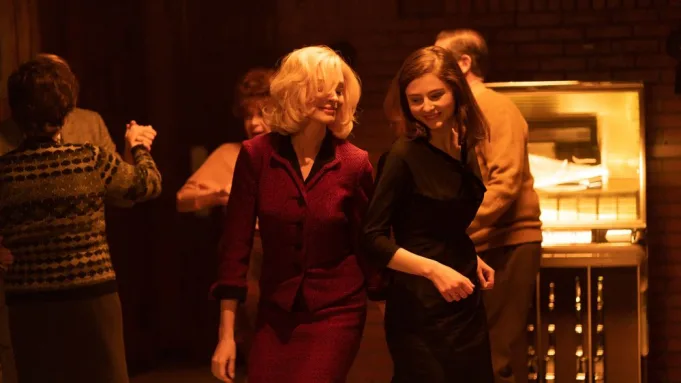
Imagine Carol but make it film noir. You’d get William Oldroyd’s Eileen. Based on Ottessa Moshfegh’s novel of the same name, it feels like a Patricia Highsmith novel directed by Douglas Sirk and Alfred Hitchcock. It has both that stunning Sirk cinematography, layered over Hitchcock suspense. One of the most divisive films at Sundance, it makes bold, unexpected choices that won’t sit well in execution for many. But it’s admirable how it turns the tables on the noir by rewriting its dynamics and making it fresh. Eileen is bonkers and intoxicating, but so fun if you can roll with it.
Opening with a classic Cinemascope-style title card, it’s a cold Massachusetts winter in 1964. Eileen (Thomasin McKenzie) is a mousy 24 year old and working at a prison. Her mother is dead, and she takes care of her abusive, ex-cop alcoholic father Jim (Shea Whigham). She’s intrigued by the case of a boy named Lee Polk (Sam Nivola) who went to jail for stabbing his father to death. Freedom from her dad is a fantasy she’s desperate to achieve, and the film unexpectedly interrupts with scenes where Eileen either shoots herself or her father. The escape from her repressed, frustrating existence also comes in the sexual fantasies that occupy her mind, but a new female psychiatrist at the prison named Rebecca (Anne Hathaway) marks both a true escape for Eileen and a sexual awakening.
The Patricia Highsmith vibes become increasingly noticeable with the arrival of this older, blonde Carol-esque woman in Eileen’s life. And over a short period, you see Eileen’s fascination with Rebecca turn into love. For Eileen, there’s her life before and after Rebecca, the rest is no longer important. As much as Eileen is completely smitten, her crush looks at her with curiosity. Eileen tries hard to impress, transforming her style to make her seem older and more mature than she is. When Rebecca invites Eileen for drinks, their conversation proves engaging. Flowing smoothly like a drink of the best martini, you can listen to the pair talk for hours. The choice to have Art Neville’s “All These Things” play over this bar scene speaks to what’s going through Eileen’s mind. “I’ve got it bad,” one lyric goes, and Eileen sure does. To have a dance sequence play over this as well is an intoxicating thrill. You can feel the fire inside both of them as their bodies inch closer to each other. It’s hotter than any sex scene and you wish it wouldn’t end. Luckily for Eileen, it ends with the sweetness of a kiss.
The film sucks you into this relationship, especially with some gorgeous editing. Juxtaposing Rebecca’s face in the smoke from Eileen’s cigarette, she lives in the young woman’s every thought. And when Hathaway is absent from the screen, she interrupts our thoughts, too. Rebecca describes Eileen as plain but fascinating. She says she has a strange face, and you’re waiting for her to say that she’s “flung out of space”. The Carol comparisons are in abundance, but a wild third act puts those similarities behind it. When Rebecca invites Eileen to her house, you expect romance. But this rendezvous takes a sharp turn into true crime territory. Rebecca gets herself into a real mess and asks Eileen to help her out. What wouldn’t Eileen do for love? It’s a sudden shift in tone that’s unexpected (unless you read the book, of course) and it can be argued that the events in the third act feel unwelcomingly rushed. But if you’re all about gays doing crimes and can roll with how bonkers it turns out to be, it’s a blast.
There’s no understating how fantastic Hathaway is in this. Just like Eileen, she sweeps the audience off its feet. She carries herself with both grace and power. She can be both intimidating and approachable; fiery and frightened. In her absence, you feel it with Eileen’s yearning. The pain of that is expressed perfectly by McKenzie. Her longing glances and subtle sighs make the audience quickly understand Eileen’s feelings toward this new woman in her life. Despite not seeing Eileen very much before Rebecca enters the picture, you can feel a change in her character even with something as simple as a smile. Both stars deliver affecting and gripping performances, with Marin Ireland as Lee Polk’s mother delivering a mighty monologue.
Rebecca, while being the most fascinating character in the film, is admittedly flat. But she works to strengthen the film as a noir. She’s a femme fatale, but traditionally, they’re meant to bring destruction to the leading male character. In Eileen, a woman takes the man’s place, changing this dynamic entirely. Romance is still at the film’s center, but Rebecca’s role isn’t to destroy but to set Eileen free. She’s a character that allows Eileen to grow and become the person that would be able to escape the confines of her own prison cell. It reshapes the noir, but whether it pulls it off will surely be hotly debated.



